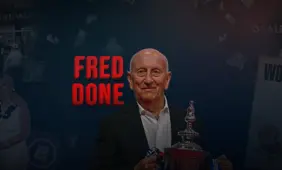Phil Ivey – From No Home Jerome to Tiger Woods of Poker

Many poker players have left their mark on the world over the past few decades, but few have done as much as Phil Ivey, widely considered to be the best overall poker player in the world.
From an early age, Ivey showed an immense talent for the game and the killer instinct that will get you places at the poker tables. His fearless nature and intimidating presence have made him into a living legend of poker, stories of which are told around the world.
Ivey started his poker career as a young man and is still going strong now in his forties. In just over two decades, Phil went from busting his small bankrolls in Atlantic City cardrooms to playing the highest stakes games in the world in places like Macau, Melbourne, and London. Phil Ivey net worth is currently $100 million.
Much has been told about Poker Phil Ivey (the Tiger Woods of Poker) over the years, but I wanted to take another look at the phenom himself and put together a comprehensive poker biography for anyone looking into the life and career of the greatest who ever played the game.
Phil Ivey Highlights

- Played poker with a fake ID and got the nickname "No Home Jerome"
- Won 10 WSOP gold bracelets
- Won $20,000,000 at Full Tilt Poker and $32,000,000 in live poker tournaments
- Was part of the original cast of Full Tilt Pros
- Was accused of "edge sorting" with a partner in European and American casinos
- Plays the highest stakes cash games in the world
- Involved with crypto and NFT projects in 2022.
Phil Ivey’s Humber Beginnings
When you look at Phil Ivey now, all you see is the success and the money, but things weren't always so bright in Ivey's world, as his early life and career were certainly a struggle.
Born in Riverside, California, Ivey moved to New Jersey with his family in 1977 as a three-month-old baby. They found a home in Roselle, and Ivey would go on to graduate the Old-Bridge High School in the Old Bridge Township, NJ.
According to Ivey, he got the passion for the game of poker from his grandfather, who taught him how to play the game and played him for nickels and dimes when he was just a kid.
The interest grew into a real passion as he finished high school and started playing poker with his colleagues in a telemarketing firm in New Jersey.
From there, he would make weekly trips to Atlantic City, where he became notorious for beating players often three times his age who have been playing poker for decades.
The game in Atlantic City at the time was Seven Card Stud, and Ivey played with a fake ID under the name Jerome, which was the only way to make it into the casinos, as he was not yet 21 years of age.
The story of "No Home Jerome" is one that really stuck, as Ivey would notoriously bust his bankroll in AC on occasion, left with nothing at all and sleeping on the bench in the city until the morning bus would arrive to take him back home.
According to Nolan Dalla, the famous World Series of Poker executive, Ivey made it there in AC in the late 90s and was eventually beating the biggest Stud games in town to the surprise of practically everyone in the city.
Sure enough, Ivey turned 21 in 1998 and could finally start playing beyond Atlantic City and under his real name, which meant the biggest poker tournaments were now open to him as well.

“You get your chips your way, I’ll get my chips mine.”
Phil Ivey’s Professional Poker Career
While he has one recorded cash in a small customer appreciation tournament in Atlantic City from 1998, it is widely considered that Phil Ivey poker career started in 2000.
In April that year, Ivey won a $540 Limit Hold 'em tournament in Tunica during The First Annual Jack Binion World Poker Open. He took home some $53,000 as well as his first-ever tournament title.
A few other cashes in Tunica took Ivey to Las Vegas, where he would participate in his first-ever World Series of Poker, just 23 years of age.
In late April, Ivey made a couple of deep finishes, a 12th and a 5th place, before taking down his first gold bracelet on May 5, 2000.
The tournament in question was the $2,500 Pot-Limit Omaha. Ivey made the final table which included the likes of Dave Ulliott, Phil Hellmuth, and Amarillo "Slim" Preston.
Ivey didn't fit in this room for his age, his ethnicity, and his lack of experience, but he never let any of this stop him in his tracks.
He made it all the way down to the heads-up match against Amarillo Slim, who reportedly had no respect for "the black kid," as he called him, but Ivey swept the floor with Slim and made the first of the many headlines that would come in his life.
The $195,000 win at the WSOP and the notoriety that winning his first bracelet gave him were enough to propel Ivey's professional poker career.
He was no longer No Home Jerome, but rather Phil Ivey, the poker champion who beat Amarillo Slim, one of the game's legends.
Back in the day, winning a tournament would not mean you get staked to play high-rollers, and Ivey had to keep playing with his own bankroll, which he did with a reasonable amount of care and great bankroll management skills.
Ivey avoided playing too high in his early days and would often be seen playing $500 or $1,000 tournaments, continuing to build up his roll.
Results kept on coming, but he would not secure any new wins until 2002. He kicked off that year with a win at the LA Poker Classic in February for $79,000 and followed that up by winning his second, third, and fourth gold bracelets at the WSOP.
The 2002 WSOP was the festival that made Ivey into a legend. He won a $1,500 Seven Card Stud, a $2,500 Seven Card Stud Hi/Lo tournament, and a $2,000 S.H.O.E. event before making a deep run in the Main Event.
These results gave Ivey almost $400,000 in cash to work with and the kind of reputation you can only get by achieving the impossible. Ivey won three bracelets while playing against some of the world's greatest players, and it was clear to everyone that he was a force to be reckoned with.
This new bankroll boost gave Ivey the kind of confidence to play in bigger poker tournaments, and he was now a regular in $10k and $25k tournaments, although you could still see him playing smaller events as well and exercising great bankroll management.
The wins and deep finishes kept on coming, and Ivey was dominating the poker world, which was now blowing up thanks to the "Moneymaker Effect" that was in full force.
In June 2005, Ivey took home his fifth WSOP gold bracelet in a $5,000 PLO event, worth $635,000, followed by a 20th place in the Main Event worth just over $300,000.
In November 2005, Ivey won a cool $1,000,000 for the first time in his career, taking down the $25,000 No-Limit Hold 'em event at the Monte Carlo Millions.
The wins in Ivey's early career are too many to number, but his 2008 victory at the LA Poker Classic Championship event that won him $1,596,000 is certainly one well worth noting.
In 2009, he won yet another gold bracelet in the 2,500 PLO/Seven Card Stud Hi/Lo event for over $220,000 and a $2,500 No-Limit Deuce to Seven Draw event, demonstrating his absolute expertise in all forms of poker.
Sure enough, he came back to the WSOP the next year and won the $3,000 H.O.R.S.E event for $363,000, proving his mixed games expertise.
The 2012 WSOP was an especially interesting one for Ivey, who made five final tables but didn't manage to take home any gold that time around. He did, however, take home some $700,000 for his efforts that year.
By this time in his life, The Tiger Woods of Poker was already dominating the $100,000 and $250,000 tournaments and winning millions there, but his passion for bracelet events was not gone.
In 2013, Ivey won a small and unassuming $2,200 Mixed Game event at the WSOP APAC leg of the Series, which was good for his ninth gold bracelet.
He kicked off 2014 by taking home nearly $4,000,000 from the Aussie Millions $250,000 Challenge and went back to the grind at that year's WSOP, where he won his tenth bracelet in a $1,500 Eight Game Mix tournament for "just" $167,000.
Since then, Ivey's appearances at the WSOP have been less frequent. He made a series of cashes at the 2019 WSOP and followed up with numerous ITM finishes at high-roller around the world but has not appeared at the 2021 WSOP despite many expecting him to.
Ivey's poker career took him to distant land such as Russia and China, where he now plays some of the absolute biggest cash games anywhere in the world.
Throughout his career, Phil was notorious for playing the biggest games in Las Vegas and beyond when there was no good tournament running, and he kept building on this and playing even higher in the new gamblers' paradises that emerged across the world.
Phil Ivey and Full Tilt Poker
Back in the early 2000s, Phil Ivey became involved with Full Tilt Poker, the world's biggest and fastest-growing poker site.
Full Tilt Poker was founded by a group of poker players that included the likes of Chris Ferguson and Howard Lederer. Other great poker names like Mike Matusow, Erik Siedel, and others were also involved, and together they formed the "Full Tilt Pros."
FTP was the place to come and "play with the pros," which was the slogan of the company for many years of its operation.
In those days, life was truly good for Ivey. Not only was he crushing the tournament poker circuit, but he also managed to win close to $20,000,000 on his FTP account, playing some of the biggest online cash games ever recorded.
Ivey played in the famous games against Viktor "Isildur1" Blom, competed against Tom "durrr" Dwan, and regularly battled it with fellow pro Patrik Antonius.
In 2011, it all came crashing down for Full Tilt Poker, as the company was shut down by the US Department of Justice and the likes of PokerStars and Ultimate Bet Poker.
While Ivey had nothing to do with the company's finances, it turned out that the site was not operating legally, and they owed millions of dollars in player deposits they could not pay back.
Phil left FTP, and his reputation did not take a big hit because it was clear he had very little to do with the operational side of things.
What we do know is that Ivey won close to $20,000,000 in cash at FTP, along with any profits that may have come from being a part-owner of the site for a decade, possibly tens of millions of dollars.
Phil Ivey – The Life of a Gambler
One could easily think that someone so good at poker would never gamble when the odds were against him or exercise poor bankroll management.
Yet, if the stories are true, Phil Ivey actually had a neck for gambling that may have cost him millions over his younger years.
The stories of Phil Ivey baccarat play are a thing of legends (read more about Phil Ivey lawsuit here), as are his infamous prop bets on the golf courses, which were often made for hundreds of thousands and even millions of dollars.
In his 20s and 30s, Ivey was famous for traveling the world on a private jet, partying in the best nightclubs worldwide, and spending hundreds of thousands on entertainment and pleasure.
While these partying days may be behind him now, these things marked an era in Ivey's private life. Yet, Ivey remained humble in all public appearances and never gave off a vibe of someone who deems himself as better than anyone else.
Where Is Phil Ivey Today?
A lot has changed in Phil Ivey's life over the years. A decade ago, you could see Ivey party it up in Vegas' most exclusive nightclubs and come back to play a WSOP event the next day, but these things are now in the past.
In a recent interview Ivey gave to Joe Ingram, the champion talked about his new lifestyle, which includes meditation, yoga, and many healthier habits than those he used to exercise back in the day.
Ivey is not seen on the poker tournament circuit a lot anymore, but he has made a few appearances in televised poker events in the last couple of years.
Ivey appeared on Season 8 of High Stakes Poker and is also scheduled to appear on Season 9, bringing back the original TV poker content in 2021 and 2022.
Even more, interestingly, Phil made an appearance on Hustler Casino Live, a YouTube stream from the Hustler Casino, which has been one of the most popular live-streaming poker shows in recent months, where he played with Tom Dwan and the local players.
A quick look at Phil Ivey's Twitter (@philivey) will show you that he's also become involved with some interesting projects both in and away from poker.
Looking forward to what’s ahead with @MomentsAuction pic.twitter.com/AN39JV0tLY
— Phil Ivey (@philivey) October 27, 2021
For one, Ivey is part of the Virtue Poker project, a play-to-earn poker platform that's powered by cryptocurrencies and giving away NFTs and other virtual goods to the biggest winners.
Phil is a fairly private guy, so we don't know too much about his day-to-day life, but he has announced that he would be returning to the WSOP and trying to win even more bracelets and titles in the years to come, competing in the game that's made him who he is today.
FAQ
How Much Is Phil Ivey Worth?
As of 2022, it is thought that Phil Ivey has a net worth of around $100 million.
How Old Is Phil Ivey?
Phil Ivey was born February 1, 1977 and at the time of writing this article he was 45 years old.
How Many Bracelets Does Phil Ivey Have?
Phil Ivey has won 10 World Series of Poker bracelets. He won his first in 2000, a further three in 2002, another in 2005, two more in 2009 and one in 2010. He then won a bracelet at the 2013 World Series of Poker Asia Pacific before claiming his most recent bracelet at the 2014 WSOP.
How Did Phil Ivey Make His Money?
Phil Ivey made the majority of his money by playing in high-roller poker tournaments. However, he has also been known to play baccarat – a game that got him involved in what is known today as the Phil Ivey cheating scandal, and blackjack. He is also likely to have made money through endorsements and sponsorships.
Is Phil Ivey MasterClass Worth It?
The Phil Ivey MasterClass is worth trying for both novice poker players and skilled professionals from the poker world. If you would like to learn how to play poker like the best poker player in the world, we suggest you give it a shot.





Review this Blog
Leave a Comment
User Comments
comments for Phil Ivey – From No Home Jerome to Tiger Woods of Poker